Joyce Audio – Audiobooks: Biography & Criticism
- At October 03, 2022
- By Great Quail
- In Joyce
 0
0
Joyce Audio: Biography & Criticism
This page profiles professional recordings of Joycean biography, criticism, lectures, and other Joycean commentary. Most links take you Amazon, where you may listen to samples and download digital “aax” files for your Audible-enabled device. Other media such as LP, cassette, CD, MP3, and FLAC are listed separately.
Joyce Audio
[Main Page | His Own Voice | Collections | Dubliners | Portrait | Ulysses | Finnegans Wake | Drama & Poetry | Biography & Criticism | Miscellany]
Biography
James Joyce
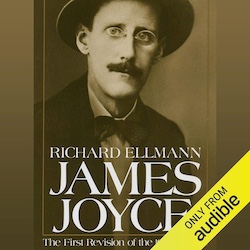
James Joyce
By Richard Ellmann
Read by John Keating
Audible Studios, 2014
Unabridged; 37 hours, 48 minutes
Richard Ellmann’s monumental biography remains the definitive book on Joyce, and is profiled under “Joyce Biographies.” This unabridged reading was made by John Keating, an Irish actor and member of the Irish Repertory Theatre of New York City. While Ellmann was an American with an academically-trained speaking style, Keating reads the biography in a bright, Tipperary accent, his manner light and occasionally playful. Given the tremendous length of this audiobook—longer that most unabridged readings of Ulysses and Finnegans Wake!—Keating’s approach is a blessing, and prevents James Joyce from unspooling like an endless lecture. Recommended!
Note: John Keating is not the first narrator to tackle an unabridged reading of Ellmann’s James Joyce. In 1984, the English actor Patrick Horgan recorded the biography for the American Foundation for the Blind. Lasting 41 hours and 13 minutes, this “talking book” was originally released on mono tape, and later transferred to a digital flash cartridge. A year later, Horgan recorded an unabridged Finnegans Wake for the AFB. The Library of Congress has an entry for Horgan’s James Joyce, but it’s only obtainable through the NLS, and the Internet has few other details. Hopefully one day somebody will liberate Horgan’s reading and post the MP3s online, as they’ve done with his historic recording of Finnegans Wake!
James Joyce
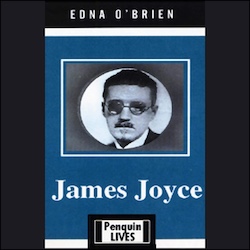
James Joyce
By Edna O’Brien
Read by Donada Peters
Random House Audio, 2000
Unabridged; 14 hours, 22 minutes
Published in 1999 by Irish novelist Edna O’Brien, James Joyce is a slim biography written in a prose style influenced by Joyce himself. The Brazen Head features the book under “Joyce Biographies,” and gave it a full review after it was originally published. The audiobook version was recorded in 2000 by Books on Tape, one of the first audiobook companies on the market. Founded in 1975 by former Marine pilot and Olympic rower Duvall Hecht, the California company began life as a rental service, dispatching cassettes by mail. In 2001 Hecht sold the company to Random House, and Books on Tape became “Random House Audio.” James Joyce is read by the venerable Donada Peters. A British actress who relocated to California, Peters was responsible for hundreds of audio recordings in the 80s and 90s, and was named a “Golden Voice” by AudioFile magazine. Peters reads the biography much like O’Brien wrote it—like a novel, filled with abundant drama and sharp characterizations. Nevertheless, her tone is weighted by a grandeur that sometimes overburdens O’Brien’s fluid prose and tends towards pomposity. It’s not a deal-breaker, but it’s a reminder that audiobook narrations have become more stylish since the literal days of “books on tape!”
Publisher’s Description: One of Ireland’s best current novelists provides a thumbnail sketch of Ireland’s greatest writer. A passionate and sensuous portrait, James Joyce is a return to the land of politics, history, saints, and scholars that shaped the creator of the 20th century’s groundbreaking novel, Ulysses. O’Brien traces Joyce’s early days as a rambunctious young Jesuit student; his falling in love with a tall, red-haired Galway girl named Nora Barnacle on Bloomsday; and his exile to Trieste where he found success, love, and finally, despair. Joyce’s raucous life as well as thoughtful commentary on his major writings is presented without the academic accoutrements that have made other Joyce biographies so difficult to read. O’Brien captures with simplicity the brilliance and complexity of this great master.
James Joyce in 90 Minutes
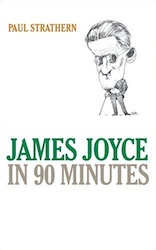
James Joyce in 90 Minutes
By Paul Strathern
Read by Robert Whitfield
Blackstone Audio, 2009
Unabridged; 1 hours, 49 minutes
Also available as: CD
Paul Strathern’s “90 Minutes” books are brief introductions to various artists and philosophers. James Joyce in 90 Minutes is read by Robert Whitfield, one of the aliases used by “Golden Voice” reader Simon Vance. He narrates the primer in the style of a documentary or lecture, his British accent and measured pace a sure sign of “seriousness” to American ears. There’s absolutely nothing wrong with his reading, but it does lend this slender book a gravitas it may not entirely deserve!
Publisher’s Description: Building on his enormously successful series of Philosophers in 90 Minutes, Paul Strathern now applies his witty and incisive prose to brief biographical studies of the world’s great writers. He brings their lives and ideas to life in entertaining and accessible fashion. Far from being a novelty, each book is a highly refined appraisal of the writer and his work, authoritative and clearly presented. From a young age, James Joyce showed a precocious and original intellect and a confidence in his own artistic destiny. He would indeed go on to transform the nature of modern literature, employing a unique stream-of-consciousness technique rich in symbolism and wordplay. Through his art, the Dublin native sought to reveal the radiance and meaning that lurks in the everyday world—“the soul of the commonest object”—evoking a heightened sense of consciousness within the grit of common life. James Joyce in 90 Minutes offers a concise, expert account of Joyce’s life and ideas and explains their influence on literature and on man’s struggle to understand his place in the world. The book also includes a list of Joyce’s chief works, a chronology of his life and times, and recommended reading for those who wish to delve deeper.
The Life and Legacy of James Joyce: Pioneer of Modern Literature
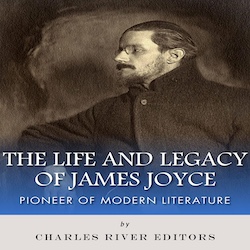
The Life and Legacy of James Joyce: Pioneer of Modern Literature
By The Charles River Editors
Read by Mark Norman
Charles River Editors, 2017
Length: 1 hours, 18 minutes
Written in a brisk, ironic style, this slim introduction to Joyce is profiled under “Joyce Biographies.” The audiobook is read by British voice actor Mark Norman, who sounds exactly like he’s narrating a BBC news segment. It’s as professional as it gets, but he occasionally misses the subtle humor of the text.
Publisher’s Description: James Joyce is the high priest of modernist writing who lived a life of endless sacrifice to literature, loaded with poverty and petty humiliations. He blazed the path of the writer as resolute individualist, rejecting all conformity and risking everything, even public shaming, in order to “communicate” over the supine body of language with his enthralled readers. He once remarked to his younger brother Stanislaus, “Don’t you think there is a certain resemblance between the mystery of the Mass and what I am trying to do? I mean that I am trying…to give people some kind of intellectual pleasure or spiritual enjoyment by converting the bread of everyday life into something that has a permanent artistic life of its own…for their mental, moral, and spiritual uplift.” Joyce pioneered modern literature through his use of stream of consciousness, a literary technique that lets readers get straight into the mind of the book’s characters and stands in stark contrast to Ernest Hemingway’s “iceberg” style of leaving things to the readers’ imaginations. In his masterpiece Ulysses, Joyce explores several topics and thoughts that go through the mind of one man in Dublin for a day, and he also wrote other critically-acclaimed works such as the short-story collection Dubliners (1914), and the novels A Portrait of the Artist as a Young Man (1916) and Finnegans Wake (1939). He said of his frequent use of Dublin as a setting, “For myself, I always write about Dublin, because if I can get to the heart of Dublin I can get to the heart of all the cities of the world. In the particular is contained the universal.” The Life and Legacy of James Joyce: Pioneer of Modern Literature profiles the life and career of one of America’s most famous entertainers. You will learn about Joyce like you never have before, in no time at all.
James Joyce: A Very Short Introduction
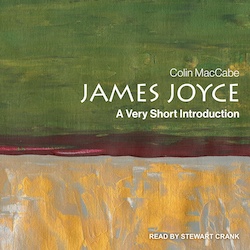
James Joyce: A Very Short Introduction
By Colin MacCabe
Read by Stewart Crank
Tantor Audio, 2022
Unabridged; 4 hours, 2 minutes
Born in 1949, Colin MacCabe is a British writer and film producer who currently teaches literature and film at the University of Pittsburgh. His introduction to Joyce is read by Stewart Crank, the British voice actor from Museum Audio’s Ultimate James Joyce Collection. Crank reads MacCabe’s biography like he’s telling a story, and the fact he’s recorded an unabridged Ulysses earns the listener’s trust—Crank may not have written this book, but his Joycean credentials are beyond reproach! Lasting twice as long as James Joyce in 90 Minutes, A Very Short Introduction may not be the “very shortest” introduction to Joyce, but the writing is more engaging, and Crank’s personal approach holds the listener’s attention better than Whitfield’s lecturing. Recommended.
Publisher’s Description: James Joyce is one of the greatest writers in English. His first book, A Portrait of the Artist as a Young Man, laid down the template for the coming-of-age novel, while his collection of short stories, Dubliners, is of perennial interest. His great modern epic, Ulysses, took the city of Dublin for its setting and all human life for its subject, and its publication marked the beginning of the modern novel. Joyce’s final work, Finnegans Wake, is an experiment in narrative and language. But if Joyce is a great writer he is also the most difficult writer in English. This Very Short Introduction explores the work of this most influential yet complex writer, and analyzes how Joyce’s difficulty grew out of his situation as an Irish writer unwilling to accept the traditions of his imperialist oppressor, and contemptuous of the cultural banality of the Gaelic revival. Joyce wanted to investigate and celebrate his own life, but this meant investigating and celebrating the drunks of Dublin’s pubs and the prostitutes of Dublin’s brothels. No subject was alien to him and he developed the naturalist project of recording all aspects of life with the symbolist project of finding significant correspondences in the most unlikely material. Throughout, Colin MacCabe interweaves Joyce’s life and history with his books and draws out their themes and connections.
James Joyce: A Life from Beginning to End
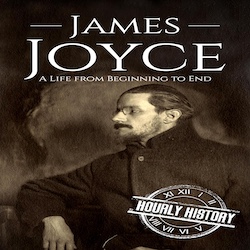
James Joyce: A Life from Beginning to End
Read by Matthew J. Chandler-Smith
Hourly History, 2022
Length: 1 hours, 2 minutes
“Hourly History” is a series of pop-history books advertised as “concise history books you can read in an hour.” They also publish biographies under the “Life from Beginning to End” moniker, covering everybody from Karl Marx to Whitney Houston. This is their offering on James Joyce, and it’s exactly what you’d expect: a modern Cliffs Notes intended for students or reading group members who reluctantly signed on to Dubliners (or god forbid, Ulysses!) As with many Hourly History books, it’s narrated by Matthew J. Chandler-Smith, who reads with a broad, American accent in a tone reserved for speaking to idiots—his voice has that artificial “narrator” vibe common to prime-time news segments or late-night infomercials. (Where’s Troy McLure when you need him? Just imagine a world without zinc!) Anyway, the publisher’s description is adapted directly from the book’s intro, so if you’re interested in learning more about “the number one literary voice of Ireland,” knock yourself out!
Publisher’s Description: Few figures in Irish history are as well known as James Joyce. He was born into hardship in a country mired in political conflict, but rather than allow himself to get bogged down, he used his experiences to create some of the finest pieces of modernist literature to date. His work, in his time, was both subversive and controversial. On the one hand, it made publication difficult, which contributed to Joyce spending the majority of his life in poverty. On the other, it generated free publicity and broader public interest, which eventually led him to success. James Joyce is considered the number one literary voice of Ireland, and for good reason. In this book, we discover his life and his story from beginning to end.
Criticism
A Skeleton Key to Finnegans Wake
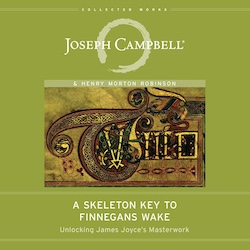
A Skeleton Key to Finnegans Wake
By Joseph Campbell & Henry Morton Robinson
Read by Arthur Morey
Brilliance Audio, 2020
Unabridged; 16 hours, 36 minutes
One of the first books written about Joyce’s inscrutable novel, A Skeleton Key to Finnegans Wake was co-authored by the celebrated mythologist Joseph Campbell (1904-1987), author of The Hero with a Thousand Faces. (A more detailed review of Skeleton Key may be found under “Finnegans Wake Criticism.”) It’s read by Arthur Morey, the former managing editor of Renaissance books who eventually became a “Golden Voice” reader himself. Having described Campbell’s Masks of God as his most challenging audiobook—requiring him to do a significant amount of research to correctly pronounce nearly 2500 names of gods and heroes!—he was a natural fit for Campbell’s Skeleton Key. It also helps that Morey was a professor of Comp Lit at Northwestern University and the Art Institute of Chicago.
While Morey has an unusual American accent with traces of transatlantic affectations, his voice is soothing and authoritative, with an elderly rasp not unlike a “learnèd professor.” Of course, reading Skeleton Key brings one into contact with the language of the Wake itself, and Morey handles Joyce’s tangled sentences with thoughtful sensitivity. For the most part, he reads the Joycean passages with charm and drama, affecting an Irish accent when appropriate and inflecting his voice with suitable degrees of wonder, mock solemnity, and irony. When he’s less sure of a word or phrase, he includes a brief pause before reading, a subtle signal that he’s about to give it “the old college try.” While this approach may be less acceptable for a professional recording of Finnegans Wake, here it feels perfectly in tune with the spirit of Joseph Campbell, a chummy reminder that we’re all students of the Wake.
A Skeleton Key offers other challenges for a reader: its text alternates between Joycean quotations, Campbell and Robinson’s paraphrasing of those passages, their gloss on the text itself, and enough footnotes to make David Foster Wallace blush. Morey is up for all these challenges, expertly modulating his voice so the listener is never lost amidst the labyrinth of text. He also takes a few welcome liberties, adapting textual elements designed for readers into a coherent narrative flow. For instance, he integrates the footnotes directly into the appropriate text, again changing his tone so the reader understands he’s making a parenthetical insertion.
When one considers that Skeleton Key has long been superseded by other guides, and very few people have even read the Wake, one wonders how this audiobook even got made! Certainly it’s not a product designed to meet a market demand, rushed out the door to satisfy the crowds clamoring to hear Skeleton Key during their daily workout. Rather, it seems to be a labor of love, a quixotic offering of respect for a pair of literary cult figures, lovingly read by a retired professor in the twilight of his audiobook career. And if that’s not worth an Audible credit, what is?
Publisher’s Description: Countless would-be readers and listeners of Finnegans Wake—James Joyce’s 1939 masterwork, on which he labored for a third of his life—have given up after a few pages and “dismissed the book as a perverse triumph of the unintelligible.” In 1944, a young professor of mythology and literature named Joseph Campbell, working with novelist and poet Henry Morton Robinson, wrote the first guide to understanding the fascinating world of Finnegans Wake. Page by page, chapter by chapter, A Skeleton Key to Finnegans Wake outlines the basic action of Joyce’s book, simplifies and clarifies the complex web of images and allusions, and provides an understandable, continuous narrative from which the listener can venture out on his or her own. This edition includes a foreword and updates by Joyce scholar Dr. Edmund L. Epstein that add the context of sixty subsequent years of scholarship.
Mythic Worlds, Modern Words: Joseph Campbell on the Art of James Joyce
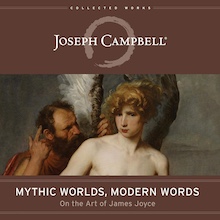
Mythic Worlds, Modern Words: Joseph Campbell on the Art of James Joyce
By Jospeh Campbell
Read by Braden Wright
Brilliance Audio, 2018
Unabridged; 12 hours, 31 minutes
This is a collection of essays and lectures about Joyce written by the American mythologist Joseph Campbell (1904-1987), co-author of A Skeleton Key to Finnegans Wake. A more detailed review of Mythic Worlds may be found under “General Joyce Criticism.” The audiobook is narrated by American actor Braden Wright, who adopts the neutral, academic tone one expects from such material. While it’s easy to slip into a dazed monotone when reading academic prose, Wright keeps the listener engaged with subtle changes in cadence, and his brief pauses and subtle emphases indicate a welcome sensitivity to the text itself. It also helps that Campbell is a darn good writer!
Publisher’s Description: In 1927, as a twenty-three-year-old postgraduate scholar in Paris, Joseph Campbell first encountered James Joyce’s Ulysses. Known for being praised and for kicking up controversy (including an obscenity trial in the United States in 1920), the novel left Campbell both intrigued and confused, as it had many others. Because he was in Paris, he was able to visit the Shakespeare & Company bookstore—the outpost of the original publisher of Ulysses, Sylvia Beach. She gave him “clues” for reading Ulysses, and that, Campbell attested, changed his career. For the next sixty years, Campbell moved through the labyrinths of Joyce’s creations—writing and lecturing on Joyce using depth psychology, comparative religion, anthropology, and art history as tools of analysis. Arranged by Joyce scholar Edmund L. Epstein, Mythic Worlds, Modern Words presents a wide range of Campbell’s writing and lectures on Joyce, which together form an illuminating running commentary on Joyce’s masterworks. Campbell’s visceral appreciation for all that was new in Joyce will delight the previously uninitiated, and perhaps intimidated, as well as longtime lovers of both Joyce and Campbell.
The Most Dangerous Book: The Battle for James Joyce’s Ulysses
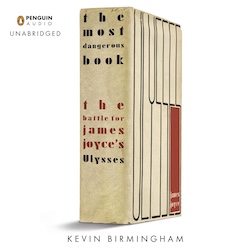
The Most Dangerous Book: The Battle for James Joyce’s Ulysses
By Kevin Birmingham
Read by John Keating
Penguin Audio, 2014
Unabridged; 14 hours, 22 minutes
Birmingham’s book chronicles the writing and initial reception of Ulysses, with a particular focus on the infamous obscenity trials. The audiobook is read by John Keating, an Irish actor and member of the Irish Repertory Theatre of New York City. He’s also got a few Joycean readings to his credit, including an unabridged recording of Richard Ellmann’s monumental James Joyce. Keating applies the same bright, cheerful tone to Birmingham’s history, sparking life into its many characters and dramatic twists. Recommended!
Publisher’s Description: For more than a decade, the book that literary critics now consider the most important novel in the English language was illegal to own, sell, advertise or purchase in most of the English-speaking world. James Joyce’s big blue book, Ulysses, ushered in the modernist era and changed the novel for all time. But the genius of Ulysses was also its danger: it omitted absolutely nothing. All of the minutiae of Leopold Bloom’s day, including its unspeakable details, unfold with careful precision in its pages. The New York Society for the Suppression of Vice immediately banned the novel as “obscene, lewd, and lascivious.” Joyce, along with some of the most important publishers and writers of his era, had to fight for years to win the freedom to publish it. The Most Dangerous Book tells the remarkable story surrounding Ulysses, from the first stirrings of Joyce’s inspiration in 1904 to its landmark federal obscenity trial in 1933. Literary historian Kevin Birmingham follows Joyce’s years as a young writer, his feverish work on his literary masterpiece, and his ardent love affair with Nora Barnacle, the model for Molly Bloom. Joyce and Nora socialized with literary greats like Ezra Pound, Ernest Hemingway, T. S. Eliot and Sylvia Beach. Their support helped Joyce fight an array of anti-vice crusaders while his book was disguised and smuggled, pirated and burned in the United States and Britain. The long struggle for publication added to the growing pressures of Joyce’s deteriorating eyesight, finances and home life. Birmingham’s archival work brings to light new information about both Joyce and the story surrounding Ulysses. Written for ardent Joyceans as well as novices who want to get to the heart of the greatest novel of the 20th century, The Most Dangerous Book is a gripping examination of how the world came to say yes to Ulysses.
The Guide to James Joyce’s Ulysses
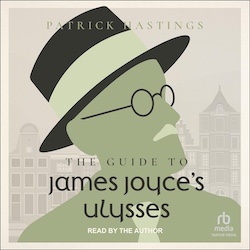
The Guide to James Joyce’s Ulysses
Written and Narrated by Patrick Hastings
Tantor Audio, 2023
Also available as: CD
Length: 10 hours, 36 minutes
Publisher’s Description: In The Guide to James Joyce’s Ulysses, Patrick Hastings provides comprehensive support to readers and listeners of Joyce’s magnum opus by illuminating crucial details and reveling in the mischievous genius of this unparalleled novel. Written in a voice that offers encouragement and good humor, this guidebook maintains a closeness to the original text and supports the first-time reader or listener of Ulysses with the information needed to successfully finish and appreciate the novel. Deftly weaving together spirited plot summaries, helpful interpretive analyses, scholarly criticism, and explanations of historical and biographical context, Hastings makes Joyce’s famously intimidating novel more accessible and enjoyable than ever before. He unpacks each chapter of Ulysses with episode guides, which offer pointed and readable explanations of what occurs in the text. He also deals adroitly with many of the puzzles Joyce hoped would “keep the professors busy for centuries.” Full of practical resources, this is an invaluable first resource about a work of art that celebrates the strength of spirit required to endure the trials of everyday existence. The Guide to James Joyce’s Ulysses is perfect for anyone undertaking a listening or reading of Joyce’s novel, whether as a student, a member of a reading group, or a lover of literature finally crossing this novel off the bucket list.
Lectures, Commentary, etc.
Thomas Merton on James Joyce
A.K.A., “All the Living and the Dead”
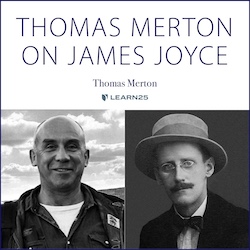
Thomas Merton on James Joyce
By Thomas Merton
Now You Know Media, 2013
Also available as: CD
Length: 2 hours, 40 minutes
Thomas Merton (1915-1968) was a Catholic priest and Trappist monk, a mystic spiritualist and pacifist who wrote the bestselling “autobiography of faith,” The Seven Story Mountain. Four months before he’d be tragically electrocuted in Bangkok, Merton derived a quartet of lectures on Dubliners to his fellow monks at the Abbey of the Gethsemani, located outside of Louisville, Kentucky. The lectures were recorded for posterity, eventually released on compact disc as All the Living and the Dead: The Literature of James Joyce.
The principal subject of Merton’s lectures is Joyce’s Catholicism. Merton sees Joyce not as an apostate or heretic, but a philosopher who rejected a “superficial” form of Irish Catholicism in favor of an aesthetic freedom and spirituality that was, paradoxically, profoundly Catholic. Merton discusses “The Dead” and “Araby,” explores Joyce’s idea of the “epiphany,” and interrogates the conflict between religious belief and artistic freedom. Another recurring topic is comedy, a subject underscored by Merton’s good humor—he laughs frequently, and occasionally jokes with his fellow monks in the audience. There’s a wonderfully informal atmosphere to the lectures, and for a Joycean, it’s especially interesting to hear Merton playfully question his fellows’ knowledge and preconceptions of James Joyce. Highly recommended!
Publisher’s Description: New York Times best-selling author and monk, Thomas Merton, exploring the literature and spirituality of 20th century’s greatest novelist: James Joyce. Born in 1882 to a Catholic family in Dublin, James Joyce wrote some of the most acclaimed masterpieces of modern literature: Ulysses, A Portrait of the Artist as a Young Man, Dubliners, and Finnegans Wake. Educated by Jesuits and deeply influenced by Thomas Aquinas, Joyce wove Catholicism into his works. Delivered in 1968, these four lectures on Joyce’s writing are now available to the public for the first time ever. This one-of-a-kind set includes an introduction by Dr. Michael Higgins, a renowned Merton biographer and scholar of literature and religion. Before becoming a Trappist monk, Thomas Merton studied English at Columbia and taught literature at St. Bonaventure University. Merton understood the essential relationship between literature and theology; indeed, God has chosen to reveal himself to us through literature. In these lectures, Merton focuses on Joyce’s short story collection Dubliners. You will look at the timeless story “The Dead” and how it embodies Joyce’s concept of aesthetics and the epiphany. Then, as you listen to Merton read the classic “Araby,” Joyce’s voice will truly come alive. This course is ideal both as an introduction to Joyce and as an exciting work of scholarship by one great author on another.
Robert Anton Wilson On Finnegans Wake and Joseph Campbell
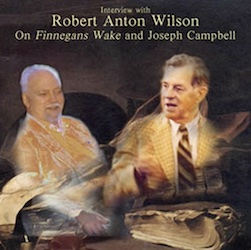
Robert Anton Wilson On Finnegans Wake and Joseph Campbell
By Robert Anton Wilson
Santa Cruz, 1988
Length: 1 hour, 25 minutes
Back in the 1980s, a certain teenage boy first heard about James Joyce from the writer Robert Anton Wilson, famous for such works as the Illuminatus! trilogy and Cosmic Trigger. After reading about the crazy wordplay in Finnegans Wake and the salacious “black mass” in Ulysses, that boy attempted to tackle Ulysses, but to no avail—“ineluctable modality of the what now?” A few years later, he finally succeeded, falling in love with Joyce so deeply he immediately launched the Brazen Head in 1995. So it’s personally rewarding to post this interview with Robert Anton Wilson in which the Great Discordian discusses his passion for Finnegans Wake. Originally released in 1988 on CD by Sound Photosynthesis, the interview is available on YouTube through the Robert Anton Wilson Archives.
From the original 1988 Sound Photosynthesis CD:
Faustin Bray and Brian Wallace interview Robert Anton Wilson on Finnegans Wake and Joseph Campbell.
Robert Anton Wilson positively rhapsodizes about Finnegans Wake, including prominent historical and literary figures contributing to his over-all hilarious, fast-paced, philosophical-political interpretation of “the great work,” Finnegans Wake.
Celebrate Finnegans Wake, James Joyce, Robert Anton Wilson and Jospeh Campbell. This is a great listen!
For nearly two decades, “Faustin and Brian Interview Series” recorded over a half dozen conversations with Robert Anton Wilson and his wife Arlen at their various homes; from Dublin, Ireland to Santa Cruz, California. In this recording, at the home in Santa Cruz, Faustin Bray interviews with Brian Wallace recording. This 2-CD album about “the great work” by James Joyce, is the product of Sound Photosynthesis’ commitment to keep relevant scholarly works available.
“Finnegans Wake is the best book published this past century.”
—Robert Anton Wilson (super-genius, Finnegans Wake scholar for over 40 years.)
Note: This compact disc is long out of print. If anyone would like MP3s or FLAC files of the original CD, please drop me a line and I’ll get them to you!
Terence McKenna: Surfing Finnegans Wake

Terence McKenna: Surfing Finnegans Wake
By Terence McKenna
McEsalen Institute, 1995
Length: 1 hour, 19 minutes
In 1995, the psychedelic philosopher Terence McKenna gave a lecture about Finnegans Wake at the McEsalen Institute in Big Sur, California. Unsurprisingly, McKenna focuses on the “psychedelic” and “apocalyptic” aspects of the Wake, which may be interesting to the sort of people who find McKenna interesting! While his pre-millennium perspective of Joyce as “the great sampler” is insightful, McKenna’s lecture is marred by numerous biographical errors about Joyce and a some careless mistakes about the Wake itself.
Joyce’s Ulysses
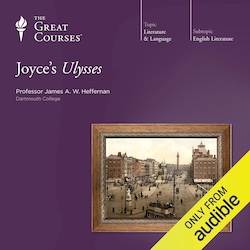
Joyce’s Ulysses
Written and Narrated by James A. W. Heffernan
The Great Courses, 2001
Length: 12 hours, 16 minutes
James Heffernan is Professor Emeritus of English at Dartmouth, and has written extensively on poetry, aesthetics, and mid-century European literature. I’ve not listened to this 12-hour series of lectures, so I can’t address their content. However, the five-minute audio sample reveals Heffernan to be a wonderful speaker: charming, engaging, and enthusiastic. If any visitors would like to comment on this set, please contact the Brazen Head!
Publisher’s Description: Ulysses depicts a world that is as fully conceived and vibrant as anything in Homer or Shakespeare. It has been delighting and puzzling readers since it was first published on Joyce’s 40th birthday in 1922. And here, Professor Heffernan maps the brilliance, passion, humanity, and humor of Joyce’s modern Odyssey in these 24 lectures that finally make a beguiling literary masterpiece accessible for anyone willing to give it a chance. Although they discuss selected points from the enormous body of critical scholarship on Ulysses, these lectures presuppose no special knowledge of literature or of James Joyce. Whether or not you’ve read Ulysses, you’ll find they make an excellent guide to the many-layered pleasures of this modern epic. Illuminating the dramatic and artistic integrity behind the novel’s most notoriously challenging passages, they explain why this frank, path-breaking novel was praised as a landmark and damned as obscene—even banned—as soon as it first appeared. You’ll come to see Ulysses as many books at once: an inspired modern reweaving of the fabric of Homer’s mighty Odyssey; a supreme synthesis of realism and symbolism; a grandly comic and at times bawdy work—a seriocomic parable about art and experience; a symphonic, kaleidoscopic portrayal of the sights, sounds, and voices of Dublin and every city; and a dazzling work of masterfully handled prose styles and narrative devices. Above all, you’ll learn to read Ulysses as an unsentimental but deeply felt story that uses concrete facts of mundane life in a particular time and place to say something truly extraordinary and universal that speaks to all that is human in us.
Joyce Audio
[Main Page | His Own Voice | Collections | Dubliners | Portrait | Ulysses | Finnegans Wake | Drama & Poetry | Biography & Criticism | Miscellany]
Author: Allen B. Ruch
Last Modified: 15 June 2024
Main Joyce Page: The Brazen Head
Contact: quail(at)shipwrecklibrary(dot)com

